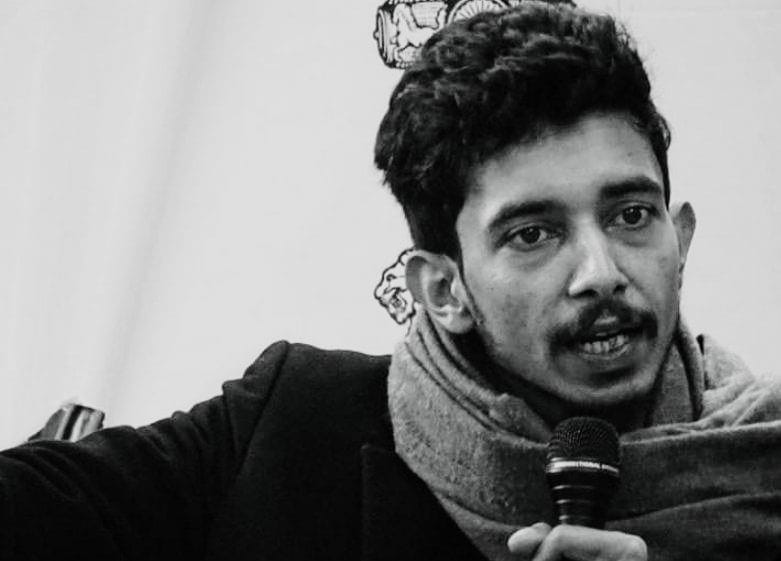On July 8, Five men in plainclothes claiming to be from Uttar Pradesh Police Crime Branch ‘arrested’ Ex Political science student of Aligarh Muslim University, Sharjeel Usmani from his hometown in Azamgarh, Uttar Pradesh.
As alleged, Usmani was booked by UP Police in connection with several cases along with the violence that broke out during the anti-CAA protests in Aligarh, last year.
https://twitter.com/ImAbdy/status/1280888439240404992
According to his family members, five unknown people claiming to be from UP Crime Branch, without a warrant or a memo, picked Usmani from outside his house in Azamgarh.
When many students are coming for unconditional solidarity with Sharjeel and claiming his arrest as Witch-Hunting, it is important to comprehend the key legal principles involved in his arrest.
The Key Legal Procedures Involved in his Arrest
1. WHEN POLICE IS ARRESTING WITHOUT WARRANT:
Under Section 41 of CrPC wide powers are conferred on police to arrest, mainly in cognizable offences, without having to go to Magistrate for obtaining a warrant of arrest. There can be no legal arrest if there is no information or reasonable suspicion that the person has been involved in a cognizable offence or commits an offence(s), specified in Section 41. As in this case “Attempt to Murder” section 307 for which Sharjeel is booked, comes under cognizable offence which justifies police’s action.
This doesn’t end here, Section 50(1) CrPC provides, “every police officer or other person arresting any person without a warrant shall forthwith communicate to him full particulars of the offence for which he is arrested or other grounds for such arrest.” But after the analysis of his father’s claim, it doesn’t seem justifiable. Apart from the provisions of CrPC, Article 22(1) of Constitution of India guarantees that “No person who is arrested shall be detained in custody without being informed, as soon as may be, of the grounds of such arrest nor shall he be denied the right to consult, and to be defended by, a legal practitioner of his choice.”
2. INFRINGEMENT OF PRIVACY
Article 21 of the Indian Constitution provides few sparkles of hope to the lives of arrested, undertrials and convicts. As per Sharjeel’s family, those five men also took away his laptop and diary which is prima facie infringement of his Right to Privacy. The Police here appeared to went ultra vires. Because the treatment of convicts has to be humane and in the manner prescribed by law.
Substantiating these claims with the landmark judgement viz. Maneka Gandhi v. Union of India {AIR 1978 SC 597} the Supreme Court held that State through the police as its principal law enforcing agency have the undoubted duty to bring offenders to book. Even so, the law and procedure adopted by the State for achieving this laudable social objective have to conform to civilized standards. The procedure adopted by the State must, therefore, be just, fair and reasonable.
Also, In Nilabati Behera v. State of Orissa and Ors.; (1993) 2 SCC 746, a three-Judge bench of Supreme Court held, “It is an obligation of the State, to ensure that there is no infringement of the indefeasible rights of a citizen to life, except by law while the citizen is in its custody, which was, therefore, absent and was overshadowed by police’s ultra vires actions.
Moreover, the precious right which is guaranteed by Article 21 of the Constitution of India cannot be denied even to convicts, under trials or other prisoners in custody, except according to the procedure established by the law.
After the legal analysis of Sharjeel’s arrest, it is imperative to consider the fact that there is a great responsibility on the police to ensure that the citizen in its custody is not deprived of his right to life which extends to his privacy. His liberty is in the very nature of things circumscribed by the very fact of his confinement and therefore his interest in the limited liberty left to him is rather precious.
This is an unlawful detention of @SharjeelUsmani & no one knows what they’re gonna to do him.
If anything happens to him, this is ENTIRELY on the judiciary which has continued to turned a blind eye to the brazen violations of fundamental rights by the UP Police & state govt. https://t.co/vMxK5ZddGL
— Saket Gokhale (@SaketGokhale) July 8, 2020
The fact that Usmani was arrested without a warrant or a memo is justifiable but what isn’t justifiable is taking away his belongings. The arrest should be an arrest of a person and not of precious fundamental rights because when acts are not justified of police, then it contrastingly substantiates “witch-hunting”. Also, keeping in view the remarks of Sharjeel’s father who refused to acknowledge this as an arrest, according to him, those five men were not in uniform, they didn’t have any arrest warrant or memo and took his son away. Cutting short the agony he concluded, this is not how legitimate arresting is done.
By – HUZAIFA SHAIKH
[zombify_post]



